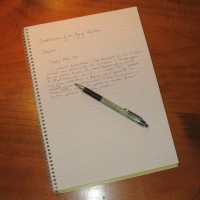Why this book?
 When my first two novels were published, friends and family started reading them and giving me very disturbing feedback. They talked as if I were Eva from Starting Over and Sophie from Life’s Journeys. The simple truth is, I’m not. Not even close.
When my first two novels were published, friends and family started reading them and giving me very disturbing feedback. They talked as if I were Eva from Starting Over and Sophie from Life’s Journeys. The simple truth is, I’m not. Not even close.
Okay, I get why people jump to this conclusion – there are a lot of similarities. Some of those are an echo of my personality. Maybe I couldn’t keep myself entirely out of my protagonists, maybe I didn’t want to. But these women are different than I in many many ways. Those books are not autobiographies. Many of the settings and scenarios are drawn from my life and my experiences but in every case, the reactions are Eva’s and Sophie’s.
After explaining this a dozen times I decided to write a book that no one could think was autobiographical. Vicky is older than I am and suffers from empty-nest-syndrome since her two grown kids have left. I’ve never had kids. This book is taken from the ether, not my past. The heroine is suffering from her choices, not mine. I’ve never worked for an auto parts store, my husband doesn’t golf, I don’t jog -we’re different!
That was my first objective. I wrote a book that can’t be mistaken for an autobiography. (I wonder how long it will be before I’m told how surprised a friend is to learn something about me that’s actually something Vicky did :-)
There was another motivation driving me when writing Confessions, I wanted it to be set in anyplace and anytime. I tried to keep all references to locations or decades out of the book. The characters have mobile phones and drive cars so it’s clearly not a historical novel, but is it set in 2000 or 2010 or 2020? That’s up to the reader. I intentionally obscured the setting as an exercise in the craft of writing: Was it possible? Would it work? Would it enhance or detract from the story if people had to create their own streetscape, rather than use Google Earth’s Streetview? I hope the reader visualises their neighbourhood, this decade, the café in their town centre. I want the reader to put themselves next door to Vicky.
I also left my story timeless for a very practical reason. I wanted to protect myself from a potential (actual) long publication process. With my two first novels, I encountered a couple of hurdles when time lagged between me typing “The End” and my publisher rolling my masterpiece off the press – I’m as immune from that as possible with this book.
That’s the thinking that put the parameters around my story. As for the story itself, I’m not sure why I told it. I guess I wanted to explore the everyday, the people next door, the friend you know well. And think about whether or not we really do know them. Whether we really know anyone. Whether we even know ourselves.
From this comes Confessions of an Aging Adulterer.




